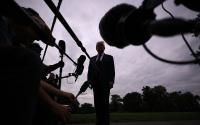Dan Plesch, Peter Beaumont and Paul BeaverSunday September 8, 2002The United States has begun the massive military build-up required for a war against Iraq, ordering the movement of tens of thousands of men and tonnes of matériel to the Gulf region.
Despite the assurances of President George Bush and Tony Blair that 'no decisions' had been made on how to deal with the threat posed by Saddam Hussein, compelling evidence has emerged in the past week that the US has begun a military build-up not seen since the last Gulf war. Among the troops arriving in the region are an estimated 2,500 in Jordan. Although officially en route for an exercise, sources claim their real purpose is to provide anti-missile protection in the Jordanian desert to give Israel advance warning against any Iraqi attack launched in response to a US invasion.
Last week Reuters reported that the US navy had chartered a large civilian cargo carrier to take battle tanks to the Gulf at the end of September. However, sources familiar with the ship's manifest claim that the cargo is missiles, ammunition and tracked transport vehicles for a build-up of munitions for an air campaign. In the next move up to 20,000 US Marines from Camp Pendelton in California are to arrive in the region in mid-October.
There have also been persistent reports that US and British Special Forces have established an operating base near Incerlik in Turkey, from which they have begun mounting liaison missions into northern Iraq in recent weeks.
Sources say British military liaison teams have arrived in the Gulf. They claim Britain is likely to agree to commit a 'division minus' - comprising two armoured brigades - to support the three US divisions expected to be deployed.
The slow but persistent build-up is reminiscent of the slow gathering of forces prior to the Gulf war, which was characterised by blanket official denials that the troop movements were related to preparations for war.
In a further sign that US and British forces are preparing for attacks on Iraq, allied aircraft struck a ground-based Iraqi anti-shipping missile site at Basra in the early hours of yesterday.
That strike followed raids against Iraqi air defence sites last week that sources claim may have involved up to 100 planes. Similar attacks have been carried out every few days this year. These types of attacks were common during the Clinton administration but were discontinued by President Bush because they were thought to be achieving little.
Their resumption is part of the military and political preparation for a larger assault. Rather than starting a new war, an option for the supporters of 'regime change' is to ratchet up attacks a step at a time, until a final drive to Baghdad.
'What is clear,' said one source, 'is that the US and Britain have begun the air phase that would be required for a wider attack, launching raids under the auspices of the existing no-fly zones. The intention is that Iraq will have no air defence capability at all should the US and UK decide to attack. It is a pretty strong message to Saddam.'
Since the Gulf war, the US has more than doubled the rate at which it can fly and ship troops around the world; it can have close to 100,000 troops available within weeks.
Despite all the talk over lack of regional allies, the US now has the use of bases in Georgia, Uzbekistan and Turkmenistan, which it did not have at the time of the Gulf war, as well as huge old Soviet airbases in Bulgaria and Romania.
Several thousand Special Forces troops are already in the Caucasus and Central Asian states, while part of the 18,000-strong 82nd Airborne Division is at hand in Afghanistan.
Among other units, a 20,000-strong Marine Expeditionary Force will arrive in the Gulf in October supported by 72 A-10 Air Force planes.
The US Army has part of its 3rd Infantry Division in Kuwait and weapons for at least one armoured division. B-52 bombers, carrier-based war planes and other bombers based in Kuwait, Turkey and Qatar are also available.
In Iraq, the US is said to be preparing forward airbases in the Kurdish-controlled north.
http://www.observer.co.uk/international/story/0,6903,788172,00.html






